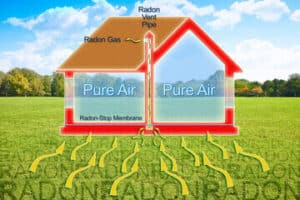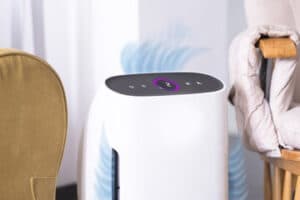We all know why is clean air important. But you wanna read more comprehensively? Don’t worry read the complete post and you will find exactly what you’re looking for!
Everyone knows that fresh air is important for our health. It’s one of the first things we’re told when we’re young – to get fresh air and move around. And there’s a good reason for that.
Studies have shown that outdoor spending can have many health benefits, from reducing stress to improving mental well-being. But what many people don’t realize is that the quality of the air we breathe is just as important as the quantity.

According to the World Health Organisation (WHO), air pollution is now the world’s largest single environmental health risk. In Europe, it is estimated to cause 400,000 premature deaths each year. Air pollution doesn’t just cause problems outdoors. The air in our homes and workplaces can also be polluted, and sometimes even more so than the air outside.
In this article, we’ll be taking a look at why clean air is important and how we can achieve it. So, keep reading!
Why Is Clean Air Important?

Everyone knows fresh air feels good, but did you know it’s essential for your health? The air we breathe is a mixture of different gases; the most important is oxygen. When we breathe in air, our lungs extract the oxygen and deliver it to the bloodstream, which carries it to the cells throughout our body. This way, oxygen is critical for maintaining cell function and supporting life.
However, the quality of the air we breathe can have a major impact on our health. Polluted air can contain harmful toxins that can damage our lungs and other organs. In extreme cases, exposure to polluted air can even lead to premature death. That’s why ensuring that the air we breathe is clean and fresh is important.
How to Improve Air Quality in Your Home?

Most people are unaware that the air quality inside their homes can be up to five times more polluted than the air outside. Fortunately, there are several steps that you can take to improve the air quality in your home and safeguard your family’s health.
- One of the most important things you can do is keep your home clean and dust-free.
- Vacuum regularly, using a vacuum with a HEPA filter, and dust all surfaces with a damp cloth.
- In addition, it is important to limit the use of harmful chemicals in your home.
- Avoid using spray cleaners and air fresheners; opt for natural alternatives instead.
- You should also make sure that your home is well-ventilated.
- Open windows regularly to allow fresh air to circulate, and install an exhaust fan in rooms where you do a lot of cooking or cleaning.
By taking these simple steps, you can significantly improve the air quality in your home and create a healthier environment for your family.
The Benefits of Clean Air
Most people are aware of the fact that air pollution can harm their health. However, they may not realize how clean air can improve their well-being. Below are just a few of the many benefits of breathing clean air:
• Improved Cardiovascular Health

Exposure to air pollution has been linked to an increased risk of heart disease and stroke. Conversely, studies have shown that living in areas with low levels of air pollution can decrease your risk of these conditions. (Source)
• Decreased Risk of Respiratory Infections

Airborne pollutants can irritate the respiratory tract and make it more susceptible to infection. As a result, breathing clean air can help to reduce your risk of developing respiratory illnesses such as bronchitis and pneumonia. (Source)
• Enhanced Cognitive Function

Several studies have shown that exposure to air pollution can adversely affect cognitive function, particularly in children and older adults. Conversely, living in areas with clean air has been linked to better cognitive performance.
From reducing your risk of heart disease to improving your cognitive function, there are many reasons to breathe clean air. You can improve your health and well-being by taking steps to reduce air pollution.
Why Should You Consider a Purifier for Your Home?

Air pollution is a growing problem in many parts of the world. Not only can it damage your health, but it can also cause damage to your home. Dust, pollen, and other airborne particles can build up on surfaces, making them difficult to clean.
They can also get into your HVAC system and spread throughout your home, causing allergies and other respiratory problems. A purifier can help to remove these pollutants from the air, providing you with cleaner air to breathe and protecting your family’s health.
In addition, a purifier can also help extend your HVAC system’s life by preventing dust and other particles from building up on the coils and other components. As a result, a purifier is an essential element of any healthy home.
How to Choose the Right Purifier for Your Needs?

When choosing a purifier, there are a few things you need to consider to find the right one for your needs. You first must identify the specific contaminants you want to remove from your water.
Once you know what you’re working with, you can narrow your options and choose a purifier to deal with those particular contaminants.
Another important factor to consider is the size of the unit. If you have a large home or office, you’ll need a purifier that can handle the increased volume of water. On the other hand, if space is limited, you may want to opt for a smaller unit.
Finally, you’ll need to decide how much you will spend on a purifier. While some units can be quite expensive, more affordable options are available. By taking all of these factors into account, you’ll be able to find the perfect purifier for your needs.
The Best Ways to Reduce Indoor Air Pollution

We can do many things to reduce indoor air pollution and improve the air quality we breathe. Some of the best ways to reduce indoor air pollution include:
Ventilate
Open doors and windows whenever possible to let fresh and stagnant air in. This is especially important when cooking, laundry, or cleaning products.
Dust and Vacuum Regularly
Dust can settle on surfaces and create indoor air pollution. Regularly dust with a damp cloth or mop, vacuum carpets, and upholstered furniture. You can find out the best vacuum here!
Avoid Using Aerosols
Most aerosols contain chemicals that can contribute to indoor air pollution. Choose natural options instead, or use essential oils diffusers.
Consider an Air Purifier
Air purifiers can help to remove some of the pollutants from indoor air. But remember, they are not a substitute for good ventilation.
FAQs
So far we have looked at the effects of air pollution and some methods of reducing exposure. Here are the answers to some frequently asked questions about air pollution.
Why Is Air Quality So Important?
Air quality is important because it can impact our health in several ways. Poor air quality can cause respiratory problems, heart disease, and other health problems. Additionally, air pollution can damage our homes and belongings.
Why Do We Need Fresh and Clean Air?
We need fresh and clean air to breathe. When the air is polluted, it can cause several respiratory problems, including asthma, bronchitis, and other respiratory illnesses.
How Do We Get Clean Air?
We can get clean air by using less energy, driving less, and using public transportation. We can also help to keep our air clean by planting trees. Trees help to filter out pollutants from the air.
How Can We Keep Our Air Clean?
There are a number of things we can do to keep our air clean. These include: Use less energy. Burning fossil fuels releases emissions into the air. Drive less. Cars and trucks produce a lot of emissions. Use public transportation.
What Happens if the Air Is Dirty?
If the air is dirty, it can cause a number of health problems. These include respiratory illnesses, heart disease, and cancer. Dirty air can also lead to premature death.
The Final Words
In this article, we have looked at the best ways to clean air pollution. We have also looked at how to choose the right purifier for your needs and the best ways to reduce indoor air pollution. Additionally, we have answered some frequently asked questions about air quality and purifiers.
So, if you are concerned about the air quality in your home or office, consider investing in a HEPA air purifier. These units can help to remove many of the pollutants from the air, including dust mites. Please comment below if you have any questions left. Moreover, if you found this article helpful, then share our website AirCleansy with your friends and family. We are dedicated to helping people improve the air quality in their homes and would love for as many people as possible to learn about us.

